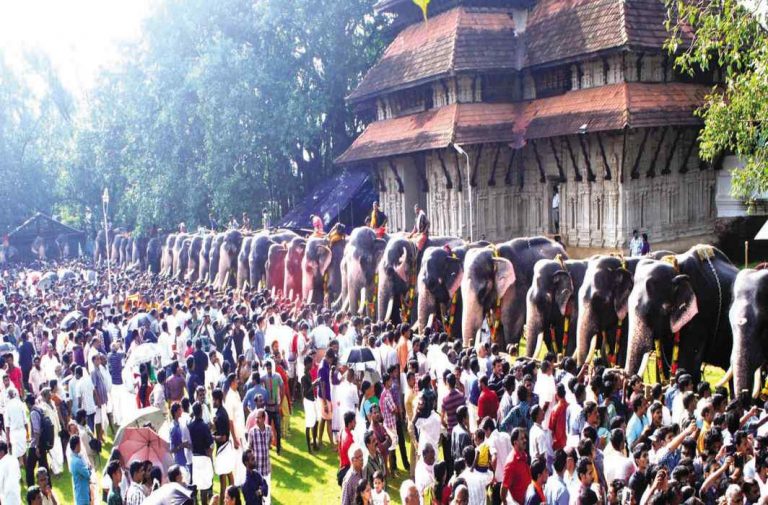
Above: Anayootu (Elephant Feeding) festival in Sri Vadakkum Nadha Temple, in Thrissur/Photo: UNI
Lack of proper care and non-enforcement of the Wildlife Protection Act have seen the death of 16 captive elephants in Kerala, leading to festivals doing without their caparisoned glamour
By NV Ravindranathan Nair in Thiruvananthapuram
As man’s cruelty towards the biggest land animal, the elephant, continues to be ignored, God’s Own Country has witnessed the death of 16 of them this year despite the state government’s attempts to bring about regulations to protect them. This could mean that Kerala festivals will be celebrated without the grandeur of the pachyderms.
The latest victim is Nandilath Arjunan, who died at the age of 58. Animal activists complain that the jumbo was tethered without proper shelter. Other elephants who died this year include Dakshayani, 89; Akkavila Kannan, 17; Thottekkattu Karthikeyan, 30; Kizhanchery Sankarankutty, 50; Priya, 35; Balaraman, 68; Veenadu Vinayakan, 32; Sreevijayam Murugan, 41; Balussery India, 46; Cheruplassery Parthan, 42; Thiruppuraickal Rajendran, 52; Mangalamkunnu Ganapathy, 69; Aralam Sivan, 22; Mullathu Kailas, 32, and Mukkomban Ganapathy, 56.
Absence of proper veterinary care and lack of enforcement of the Wildlife Protection Act have contributed to the sad plight of the jumbos. The forest department had come out with amendments to the Kerala Captive Elephants (Management and Maintenance) Rules, 2012, which are yet to be implemented. The retirement age for captive jumbos has been set at 65 years, and parading them has been restricted from 6 am to 11 am and 4 pm to 8 pm.
Speaking to India Legal, VK Venkitachalam, chairman of Heritage Animal Task Force (HATF), a Thrissur-based NGO, said the amendment suggests banning elephants that run amok, causing injuries, death or even damage to property, for a period not less than six months. HATF sought a discussion on the proposed amendments in the assembly along with effective and speedy implementation.
 But the Kerala Elephant Owners’ Federation, which opposed the proposed amendments, said that the new rules affect the parading of elephants for festivals, which is an inevitable part of ceremonies in various religions. Federation Secretary P Sasikumar told India Legal: “Some NGOs have tried to hijack traditional festivals like Thrissur Pooram through petitions in the court, but haven’t succeeded yet. Now, they have taken some forest officers on their side and have proposed these amendments.”
But the Kerala Elephant Owners’ Federation, which opposed the proposed amendments, said that the new rules affect the parading of elephants for festivals, which is an inevitable part of ceremonies in various religions. Federation Secretary P Sasikumar told India Legal: “Some NGOs have tried to hijack traditional festivals like Thrissur Pooram through petitions in the court, but haven’t succeeded yet. Now, they have taken some forest officers on their side and have proposed these amendments.”
What actually causes the premature death of captive elephants? The life expectancy of a captive elephant in Kerala is 65 years. But out of the 16 elephants who have died, only two passed the age of 60. The reason for the deaths is malnutrition and ill-treatment. Captive elephants are fed with palm and coconut palm fronds, while in their original habitat, they get grass and bamboo.
“If palm fronds are fed on a regular basis, their thorny parts get deposited in the intestine and the high fibre content causes bloating, blocking the movement of air. This causes difficulty in eating and defecating for the elephants, eventually leading to death,” said Dr Shine Kumar, assistant director and PRO of the state animal husbandry department.
Venkitachalam said an interim petition filed by the WildLife Rescue and Rehabilitation Centre seeking an order to the state government for the maintenance of captive elephants has been pending with the Supreme Court since last November. Twelve similar cases are pending with the Kerala High Court. “It is quite normal to take five or six years for the High Court to dispose of such cases. As most of the elephants are owned by Devaswoms, churches or prominent community organisations, even the judges don’t want to annoy them and take maximum time for disposal of such petitions,” he alleged.
As per the last census held in December 2018, Kerala had 521 elephants. But by January 1, 2019, three of them had died. With 16 more elephants dying within a span of eight months, the number has dwindled to 502. In 2007, there were 718 captive elephants in the state.
With the Bihar government banning elephant trade at its Sonepur fair in 2014, the supply of fresh pachyderms has dried up. Often, a single elephant is paraded in several festivals, leading to its untimely death. Most elephants die between 40 and 50 years, according to forest department statistics. Given the fact that around 200 of the 502 elephants currently in Kerala are in the age group of 40-50, the captive elephant population will decline in the future.
This will affect Kerala’s temple festivals, where part of the traditional pomp was caparisoned elephants occupying centre-stage. Very often, rival groups in the same temple or nearby festivals would vie with each other over parading more elephants.
The daily rental for an elephant ranges from Rs 25,000 to Rs 2 lakh. For celebrated elephants, the rate is higher. But with their numbers diminishing, the festivals will lose their charm. In view of the shortage of elephants and the hardship faced in complying with the forest department guidelines, many smaller temples have stopped parading elephants, and use chariots, palanquins or cardboard models of elephants.
In the next 20 years, the number of captive elephants in the state is likely to fall to 10 or 15. As of now, there are only 32 owners of captive elephants in the state. Over 200 elephants are under Devaswom Boards. The rest are either kept under possession certificates or on lease. It is a sad time for elephants.

